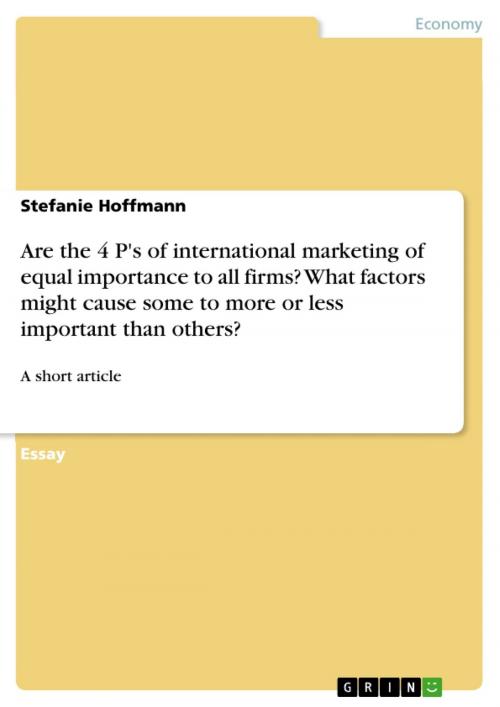Are the 4 P's of international marketing of equal importance to all firms? What factors might cause some to more or less important than others?
A short article
Business & Finance, Marketing & Sales| Author: | Stefanie Hoffmann | ISBN: | 9783638501507 |
| Publisher: | GRIN Publishing | Publication: | May 15, 2006 |
| Imprint: | GRIN Publishing | Language: | English |
| Author: | Stefanie Hoffmann |
| ISBN: | 9783638501507 |
| Publisher: | GRIN Publishing |
| Publication: | May 15, 2006 |
| Imprint: | GRIN Publishing |
| Language: | English |
Essay from the year 2005 in the subject Business economics - Marketing, Corporate Communication, CRM, Market Research, Social Media, grade: B-, Cardiff University, 11 entries in the bibliography, language: English, abstract: Are the 4 P´s of international marketing of equal importance to all firms? What factors might cause some to be more or less important than others? by Stefanie Hoffmann Nowadays marketing should be an indispensable part of all companies. Therefore many organisations and companies have marketing departments made up of marketing managers and specialists who have to coordinate the different areas of the marketing mix. Marketing has to be understood as a concept which stands at the beginning of the production process and which has to be integrated in all company areas. It describes the exact organisation, planning, execution and control of all company activities which should help to define customers´ wishes and expectations. (Lecture, Tourism Marketing, Bentele, Dr. B., Merkur Academy, 2004/2005) Nevertheless it is difficult to find an exact definition of marketing. Often it means different things to different people. As we are living in a fast-moving society, situations develop and change. The accepted UK definition is the one given by the Chartered Institute of Marketing: 'Marketing is the management process which identifies, anticipates, and supplies customer requirements efficiently and profitably.' (Lancaster and Massingham, 1999, p. 4) In general, marketing is divided into strategic and operative marketing. In principle, the strategic marketing deals with the aims of the company, for example which competitors should be observed which markets are important or which target groups should be served with which products. The chosen strategies describe the way in which the company wants to reach their focused aims. The operative marketing deals with the planning and execution of these strategies. With this aim in view, the company combines different marketing instruments which are known as the marketing mix. The most important marketing instruments are product, price, place and promotion, also known as the 4 P´s. This notion of the marketing mix is attributed to Neil H. Borden (1965) and refers to the set of marketing ingredients a company can use to achieve its objectives. (Lancaster and Massingham, 1995) [...]
Essay from the year 2005 in the subject Business economics - Marketing, Corporate Communication, CRM, Market Research, Social Media, grade: B-, Cardiff University, 11 entries in the bibliography, language: English, abstract: Are the 4 P´s of international marketing of equal importance to all firms? What factors might cause some to be more or less important than others? by Stefanie Hoffmann Nowadays marketing should be an indispensable part of all companies. Therefore many organisations and companies have marketing departments made up of marketing managers and specialists who have to coordinate the different areas of the marketing mix. Marketing has to be understood as a concept which stands at the beginning of the production process and which has to be integrated in all company areas. It describes the exact organisation, planning, execution and control of all company activities which should help to define customers´ wishes and expectations. (Lecture, Tourism Marketing, Bentele, Dr. B., Merkur Academy, 2004/2005) Nevertheless it is difficult to find an exact definition of marketing. Often it means different things to different people. As we are living in a fast-moving society, situations develop and change. The accepted UK definition is the one given by the Chartered Institute of Marketing: 'Marketing is the management process which identifies, anticipates, and supplies customer requirements efficiently and profitably.' (Lancaster and Massingham, 1999, p. 4) In general, marketing is divided into strategic and operative marketing. In principle, the strategic marketing deals with the aims of the company, for example which competitors should be observed which markets are important or which target groups should be served with which products. The chosen strategies describe the way in which the company wants to reach their focused aims. The operative marketing deals with the planning and execution of these strategies. With this aim in view, the company combines different marketing instruments which are known as the marketing mix. The most important marketing instruments are product, price, place and promotion, also known as the 4 P´s. This notion of the marketing mix is attributed to Neil H. Borden (1965) and refers to the set of marketing ingredients a company can use to achieve its objectives. (Lancaster and Massingham, 1995) [...]















